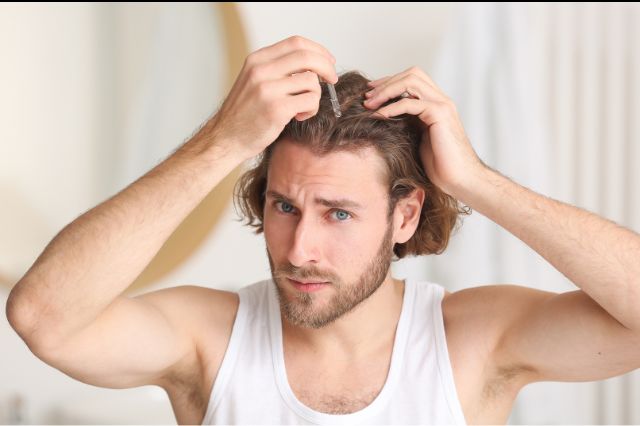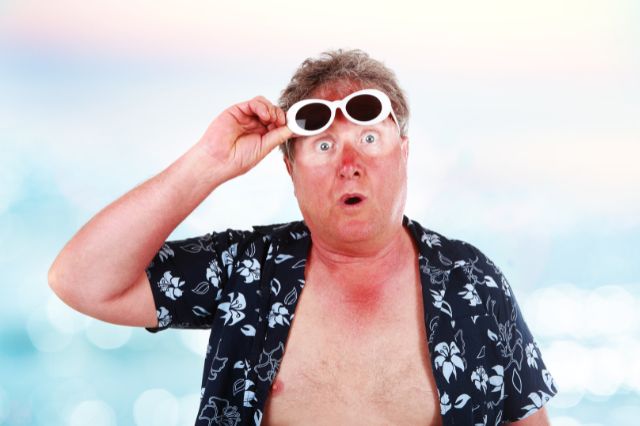Is Sun Good or Bad For Your Hair? Lordhair Shares All Angles
- Written by Vivek Khullar
- Nov 21, 2024
- |
- 11 min read
 Listen to the full text
Listen to the full textSunshine is an essential part of our daily life, bringing warmth, light, and even vitamin D. However, when it comes to hair, the sun is often considered both a friend and a foe, depending on the level of exposure. While some say sun exposure will deliver luscious strands, others blame the sun for damage. This brings us to an important question: is sunlight good or bad for hair?
Lordhair - trusted globally for men’s hair pieces and women wigs - decided to write an extensive guide explaining every aspect of sunlight and hair. By the end of this read, you will know what benefits can sun deliver and when to cut back on exposure.
Let’s get this comprehensive blog started by answering some FAQs!
Sunlight Hair Loss and Growth FAQs
Since a lot of people have very specific questions to sunlight related hair loss and hair growth, let’s first answer some common questions:
Does sunlight increase hair growth?
Yes, moderate exposure to sunlight can help enhance hair growth, primarily due to the production of Vitamin D in the body when exposed to sunlight.
Can lack of sun cause hair loss?
A lack of sunlight may lead one to lose hair but this is rather indirect. For instance, a low exposure to the sun may cause a deficiency of Vitamin D, which has been linked to hair thinning.
Is the sun good for your hair?
The sun has both positive and negative impacts on hair health. Limited exposure to sunlight is beneficial, as it aids the body in producing vitamin D that promotes hair and scalp health. On the other hand, excessive exposure to sunlight can leads to hair loss, color fading, and scalp irritation.
Can a sunburn cause hair loss?
Yes, a sunburn on the scalp can sometimes lead to temporary hair loss. When the scalp is sunburned, the skin often suffers from inflammation and damage, which may affect the hair roots.
Does hair grow back after sunburn?
In most cases, the hair will grow back after the hair roots return to a healthy state. Mild sunburns generally don’t cause lasting harm, and hair will regrow as the skin heals.
How Does the Sun Impacts Hair Health?
Just like skin, hair too is prone to damage as a result of exposure to the UV rays and heat. Sunlight has ultraviolet rays which infiltrate the hair fibers and affect the structure of the hair shaft and the scalp. Sun exposure can lead to various outcomes based on individual factors, including hair type, hair status (chemically treated, dyed, etc), and overall scalp health.
Now that we have addressed the most common questions, let’s talk in detail about the sunlight’s connection with hair, starting with benefits!

What are the Benefits of Sun Exposure for Hair?
While excessive sun exposure can be harmful, moderate sunlight offers some benefits for hair and scalp health. Here are the major ones:
Vitamin D Production: One of the main contributors to hair growth is vitamin D, which is primarily produced in the body upon the individuals' exposure to sunlight. The vitamin D activates the hair follicles, and the same is believed to help in growing and sustaining hair of good quality and strength.
Improved Scalp Health: Sunlight helps kill microbes to a certain extent, making it useful when dealing with issues like dandruff or even mild infections of the scalp.
Mood Enhancement: Sunlight increases serotonin levels in the body, promoting better mood and well-being. Since stress is a contributing factor which is known to cause loss of hair, going out and spending time in the sun can indirectly benefit hair health helping in lowering stress levels.
What are the Negative Effects of Sunlight on Hair Health?
While hair benefits of sun rays are plenty, excessive exposure to sunlight can lead to several forms of hair damage. Here are some of the major ones:
UV Damage to Hair Structure: It is a known fact that the UV rays in sunlight affect the hair structure leading to dullness, frizz and inflexibility. UV rays affect the keratin, a protein responsible for the structural integrity and elasticity of the hair, damaging the hair through breakage and split ends.
Color Fading: For those who don’t know, sun rays can speed up the process of color fading. The ultraviolet rays not only penetrate into the hair shafts, but also oxidize a chemical agent introduced into the hair dye, causing the undesired effects. Sunlight can even affect virgin hair, leading to dull blonde or bronzed hair.
Moisture Loss: Prolonged exposure from sunlight can dry up the hair especially in hot or dry regions. Moisture sink is created when long hair strands are under the sun’s heat, which evaporates the moisture within the hair and makes the hair dry and more vulnerable to breakage.
Scalp Sunburn: The scalp is often neglected when it comes to the application of sunscreen but it is very much prone to sunburns. When the scalp gets sunburnt, it can result in pain, itches, and the peeling of the skin. In some instances, temporary alopecia also occurs as the hair roots settle down after the inflammation.
Can Sun Exposure Lead to Aggressive Hair Loss?
Although it has no direct effects, the sun can cause hair shedding due to its harmful effects on the scalp and hair. Sunburn on the scalp can result in inflammation that disrupts the functioning of the hair follicles resulting in temporary hair shedding.
Prolonged exposure in the absence of protection may ultimately weaken the hair and scalp that could result in hair thinning or breakage. Also, hair that has been damaged by sun rays looks dry and stiff, causing breakage of hair which feels more like damage.
How Different Hair Types React to Sun Exposure?
Not all hair types react to sun exposure in the same way. Here’s how different types of hair are affected by sun exposure:
Curly and Coarse Hair: Curls and coarse hair are usually porous, which means that they can quickly absorb the moisture and lose it as fast. This hair type might become drier or frizz easily in the sunlight, hence more effort (and water) is needed to prevent the hair from UV damage.
Fine or Thin Hair: Fine hair is more vulnerable to UV rays, as it generally has a thinner cuticle (outer layer) to prevent the damage. For this hair type, color breakage, dry-dull hair, and excessive loss of moisture from the cuticles are concerns that manifest faster as compared to thicker and healthier hair strands.
Chemically Treated Hair: Dyed, bleached, and processed hair is most likely to get damaged by the sun as these treatments make the hair weaker. UV rays can cause color to fade quickly and make chemically treated hair feel drier and more brittle.
How to Protect Your Hair from Sun Damage?
To enjoy the benefits of sunlight without risking hair damage, here are some protective measures you can take:
Use a UV-Protective Hair Product: Hair care products containing UV filters can be used to minimize the damage. They act like sunscreen for hair to prevent the damage caused by UV radiation on the hair shafts.
Wear a Hat or Scarf: While enjoying the outdoors for a long period of time, wearing a hat or a scarf is one of the most reliable strategies to safekeep your hair from the sun. Choosing a wide brim hat will also prevent the scalp from getting sunburnt by delivering better coverage.
Limit Sun Exposure During Peak Hours: The sun is often the harshest between 10 am and 4 pm. Refrain from coming in direct contact with the sun during these hours to check damage.
Use Leave-In Conditioners and Moisturizing Masks: Hydration is vital to prevent sun damage on hair. To maintain healthy hair while preventing damage from the sun, use leave-in conditioners and extreme conditioning. However, make sure you consult with your dermatologist before selecting products.
What Other Factors Trigger Hair Fall Besides Sun Exposure?
When discussing whether the sun is good or bad for your hair health, it’s important to consider factors beyond UV exposure that can lead to hair loss. Hormonal changes, genes, medical conditions, and nutrition deficiencies should also be taken into consideration if your hair loss is escalating fast.
Having said that, full-blown recovery is almost impossible once the hair follicles have completely miniaturized or have gone into the resting stage (telogen).
For individuals with advanced hair loss and thinning, a complete reversal rarely happens.
Which is the Safest way to Recover from Advanced Hair Loss and Damage?
Hair systems and hair integration systems are greatly helpful in non surgical hair restoration. Also called toupee hair replacement systems, male hairpieces, and hair units, these are ideal for individuals seeking immediate, visible results after aggressive hair damage.
Our hairpieces are designed using high-quality materials that blend seamlessly with your existing hair. Since Lordhair specializes in hair units designed to deliver a hyper-realistic look, we recommend checking out our product catalog.

Why Choose Lordhair for Safe and Fast Hair Recovery?
In the past decade, thousands of men have trusted Lordhair for non-invasive solutions to hair loss. Here's why Lordhair is a popular choice for premium hair systems:
Quality without the middlemen
At Lordhair, all design and manufacturing of human hair replacement units are done in our own facility and shipped directly to you. This eliminates middlemen and we pass on the savings.
Promise of 100% human hair
Discover a whole new world of real hair that isn't yours. Lordhair creates the systems using Indian, Chinese, European, or virgin human hair strands that blend in well with hair.
Note: Some of these stock systems may contain synthetic gray hair. In such cases, the option for real gray human hair is possible with custom orders.
Fully customized for your hair goals
From base design to size, type of hair, color, and style, you can customize everything with Lordhair. We give our customers all the freedom in the world to create the perfect hair system.
Affordable excellence guaranteed
Owing to our factory-direct model, premium hair systems are available at less-than-premium prices. In addition to competitive pricing, we often run special sales and discounts in order to offer the most affordable wig price possible.
Sun Causes Hair Loss or Growth: Final Thoughts
We've covered everything you need to know about sunburn related hair loss. While excess exposure to sunlight can cause hair loss, it isn’t something you can’t overcome over the passage of time and with the right interventions. In case your hair loss has reached an advanced stage, we highly recommend checking our collection of men’s wigs for sale or wigs for women.
Sun isn’t the villain for hair. All you need to do is check your exposure and use the right UV protection products. Still got queries to ask about sun and hair growth? Send your queries regarding hair systems to support@lordhair.com or connect with Lordhair on Instagram.


